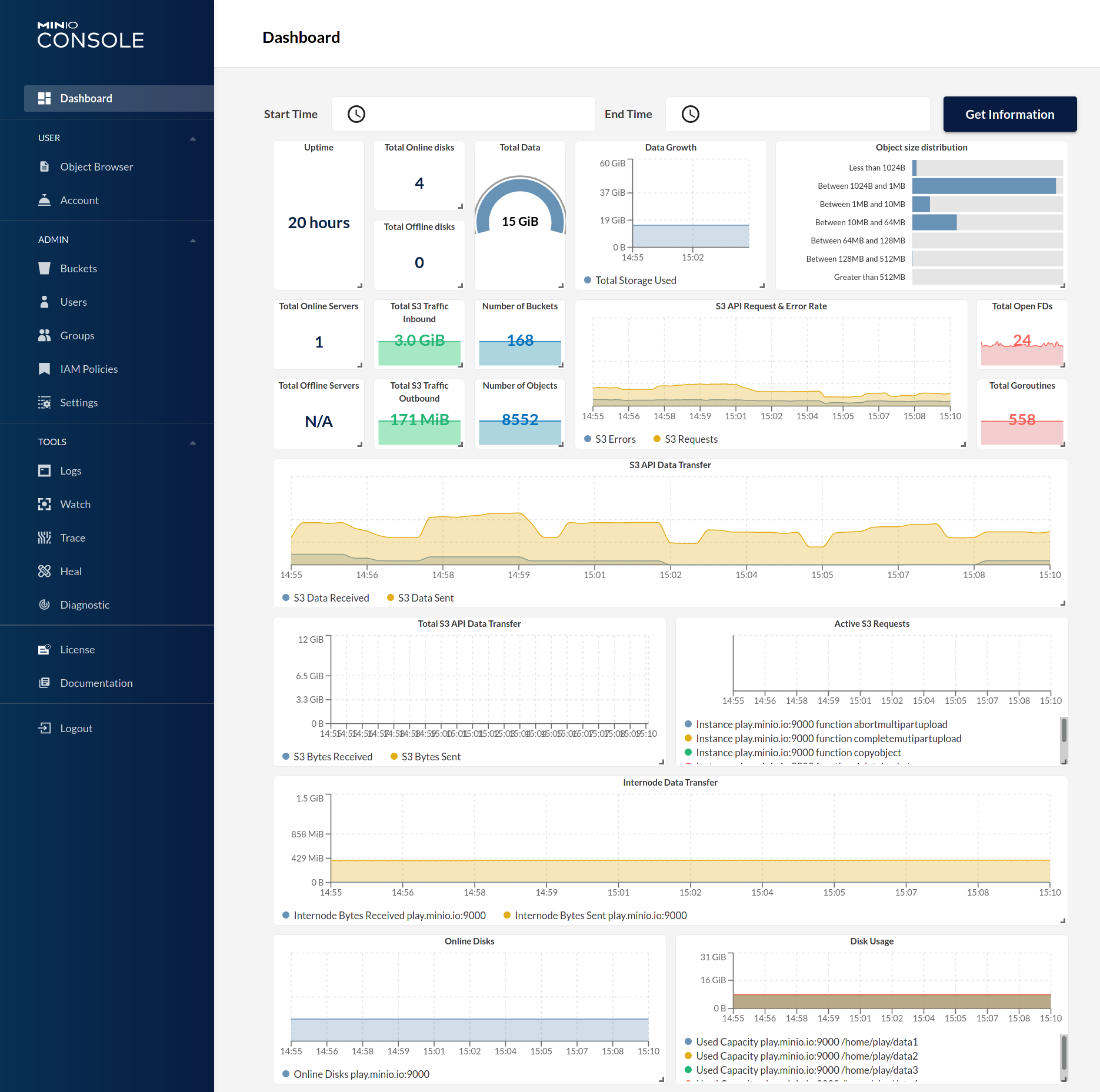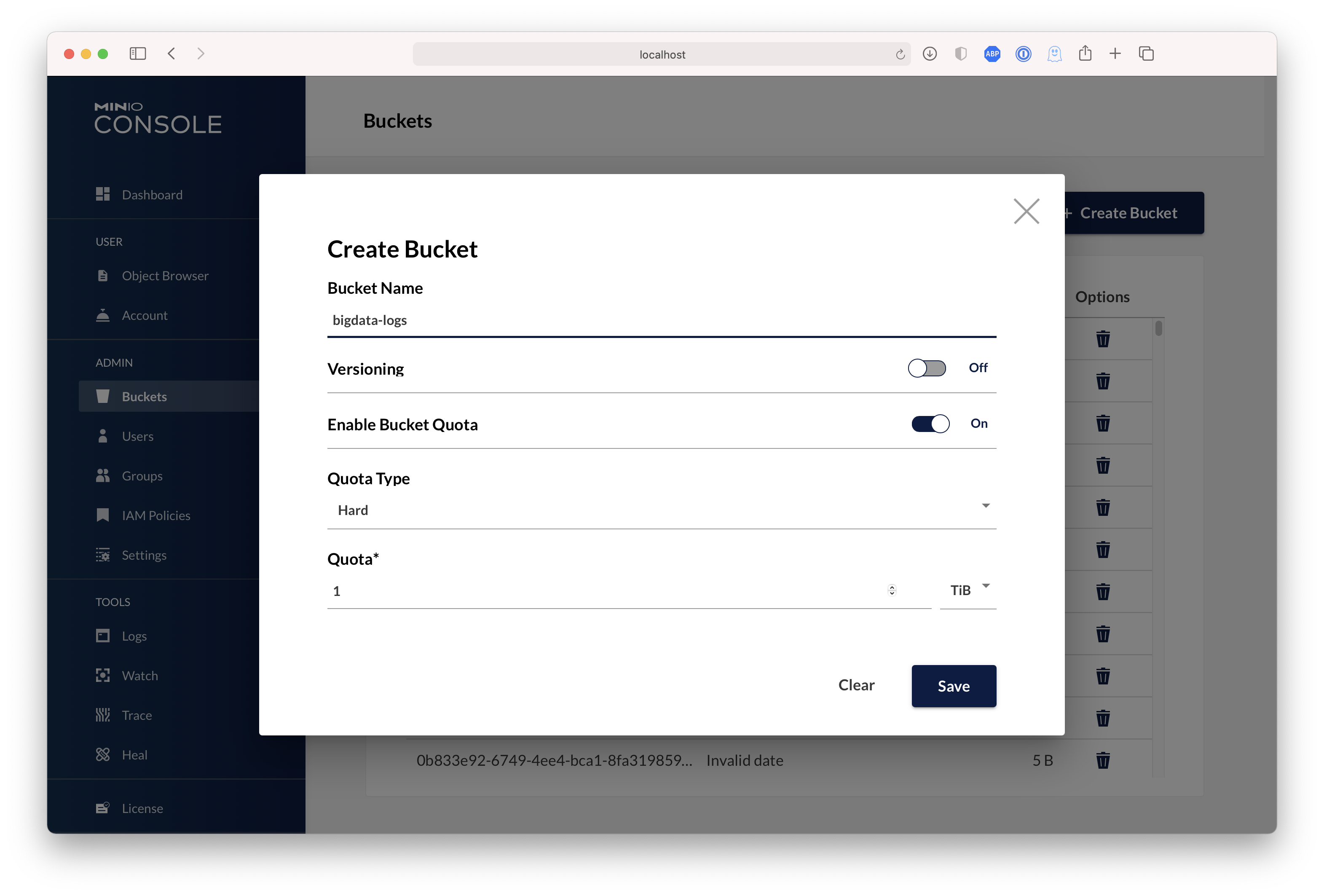mirror of
https://github.com/minio/minio.git
synced 2025-02-18 09:02:31 -05:00
98 lines
4.4 KiB
Markdown
98 lines
4.4 KiB
Markdown
# MinIO GCS Gateway [](https://slack.min.io)
|
|
|
|
MinIO GCS Gateway allows you to access Google Cloud Storage (GCS) with Amazon S3-compatible APIs
|
|
|
|
## Support
|
|
|
|
Gateway implementations are frozen and are not accepting any new features. Please reports any bugs at <https://github.com/minio/minio/issues> . If you are an existing customer please login to <https://subnet.min.io> for production support.
|
|
|
|
## 1. Run MinIO Gateway for GCS
|
|
|
|
### 1.1 Create a Service Account key for GCS and get the Credentials File
|
|
|
|
1. Navigate to the [API Console Credentials page](https://console.developers.google.com/project/_/apis/credentials).
|
|
2. Select a project or create a new project. Note the project ID.
|
|
3. Select the **Create credentials** dropdown on the **Credentials** page, and click **Service account key**.
|
|
4. Select **New service account** from the **Service account** dropdown.
|
|
5. Populate the **Service account name** and **Service account ID**.
|
|
6. Click the dropdown for the **Role** and choose **Storage** > **Storage Admin** *(Full control of GCS resources)*.
|
|
7. Click the **Create** button to download a credentials file and rename it to `credentials.json`.
|
|
|
|
**Note:** For alternate ways to set up *Application Default Credentials*, see [Setting Up Authentication for Server to Server Production Applications](https://developers.google.com/identity/protocols/application-default-credentials).
|
|
|
|
### 1.2 Run MinIO GCS Gateway Using Docker
|
|
|
|
```sh
|
|
podman run \
|
|
-p 9000:9000 \
|
|
-p 9001:9001 \
|
|
--name gcs-s3 \
|
|
-v /path/to/credentials.json:/credentials.json \
|
|
-e "GOOGLE_APPLICATION_CREDENTIALS=/credentials.json" \
|
|
-e "MINIO_ROOT_USER=minioaccountname" \
|
|
-e "MINIO_ROOT_PASSWORD=minioaccountkey" \
|
|
quay.io/minio/minio gateway gcs yourprojectid --console-address ":9001"
|
|
```
|
|
|
|
### 1.3 Run MinIO GCS Gateway Using the MinIO Binary
|
|
|
|
```sh
|
|
export GOOGLE_APPLICATION_CREDENTIALS=/path/to/credentials.json
|
|
export MINIO_ROOT_USER=minioaccesskey
|
|
export MINIO_ROOT_PASSWORD=miniosecretkey
|
|
minio gateway gcs yourprojectid
|
|
```
|
|
|
|
## 2. Test Using MinIO Console
|
|
|
|
MinIO Gateway comes with an embedded web-based object browser that outputs content to <http://127.0.0.1:9000>. To test that MinIO Gateway is running, open a web browser, navigate to <http://127.0.0.1:9000>, and ensure that the object browser is displayed.
|
|
|
|
| Dashboard | Creating a bucket |
|
|
| ------------- | ------------- |
|
|
|  |  |
|
|
|
|
## 3. Test Using MinIO Client
|
|
|
|
MinIO Client is a command-line tool called `mc` that provides UNIX-like commands for interacting with the server (e.g. ls, cat, cp, mirror, diff, find, etc.). `mc` supports file systems and Amazon S3-compatible cloud storage services (AWS Signature v2 and v4).
|
|
|
|
### 3.1 Configure the Gateway using MinIO Client
|
|
|
|
Use the following command to configure the gateway:
|
|
|
|
```sh
|
|
mc alias set mygcs http://gateway-ip:9000 minioaccesskey miniosecretkey
|
|
```
|
|
|
|
### 3.2 List Containers on GCS
|
|
|
|
Use the following command to list the containers on GCS:
|
|
|
|
```sh
|
|
mc ls mygcs
|
|
```
|
|
|
|
A response similar to this one should be displayed:
|
|
|
|
```
|
|
[2017-02-22 01:50:43 PST] 0B ferenginar/
|
|
[2017-02-26 21:43:51 PST] 0B my-container/
|
|
[2017-02-26 22:10:11 PST] 0B test-container1/
|
|
```
|
|
|
|
### 3.3 Known limitations
|
|
|
|
MinIO Gateway has the following limitations when used with GCS:
|
|
|
|
* It only supports read-only and write-only bucket policies at the bucket level; all other variations will return `API Not implemented`.
|
|
* The `List Multipart Uploads` and `List Object parts` commands always return empty lists. Therefore, the client must store all of the parts that it has uploaded and use that information when invoking the `_Complete Multipart Upload` command.
|
|
|
|
Other limitations:
|
|
|
|
* Bucket notification APIs are not supported.
|
|
|
|
## 4. Explore Further
|
|
|
|
* [`mc` command-line interface](https://docs.min.io/docs/minio-client-quickstart-guide)
|
|
* [`aws` command-line interface](https://docs.min.io/docs/aws-cli-with-minio)
|
|
* [`minio-go` Go SDK](https://docs.min.io/docs/golang-client-quickstart-guide)
|